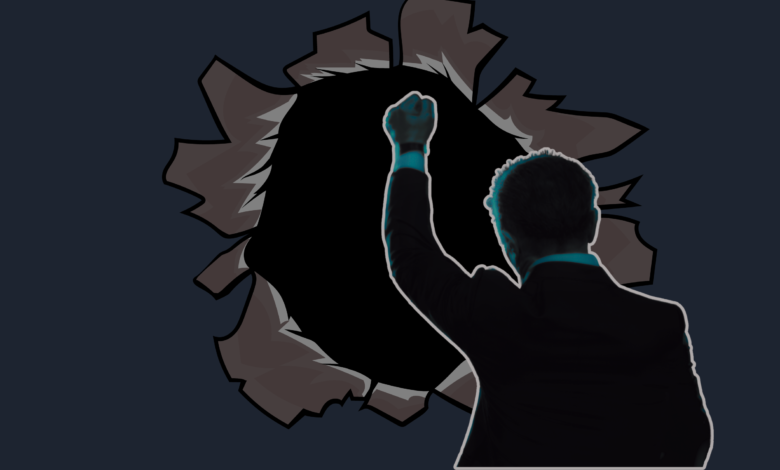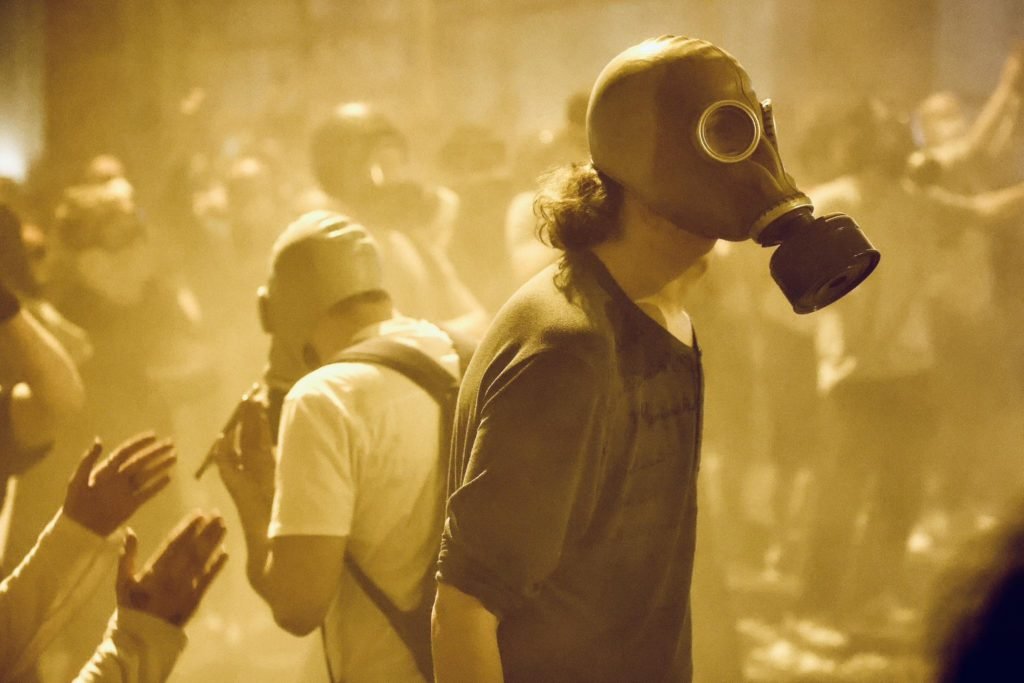
Dispatch – May 8: False Messiah
“Bi-dzi-na!” “Bi-dzi-na!”
Chants of his name interrupted Bidzina Ivanishvili, the billionaire founder and patron of Georgia’s ruling party, as he delivered his spooky villain’s speech on April 29. He was addressing a crowd of tens of thousands bused into Tbilisi that day by his party, for a counter-rally in response to growing opposition to the foreign agents’ law. Some of the April 29 demonstrators must have come of their own accord to support the ruling party’s stated quest to protect faith and traditions, but many on the government payroll were reportedly pressured to attend the muscle-flexing party.
During the event, where some of the applause appeared to be pre-recorded and the general mood was far from enthusiastic, Ivanishvili repeatedly spoke of the determination to complete his “mission”. Much of his focus was again on defeating the past. The only bright future he promised the crowd was the imminent punishment of his (and therefore their) enemies. But nothing sounded so out of time, out of place, and out of reality as the chants of “Bidzina! Bidzina!”
Weren’t such chants reserved for the remaining admirers of ex-president Mikheil (“Misha!”) Saakashvili? Hadn’t the rest of the country moved on? Nobody even knew that the billionaire’s name was meant to be chanted. Nobody thought that we would still be doing this.
Except, apparently, for Ivanishvili himself.
Here is Nini, and the Dispatch newsletter, to talk about a self-proclaimed Messiah in a country that has stopped looking for one.
Somebody to Love
It’s not easy for an average man with an inflated ego to resist the temptation to see himself as some kind of a messiah in Georgia. Not long ago, if you wanted to look smart in local political discussions, you were expected to claim that the nation was suffering from a permanent craving for a promised savior, for that “someONE”. These wise insights were rooted in reality: past decades had shown repeated patterns of hero-worshipping Georgians falling madly in love with political leaders, only to be inevitably and ultimately disappointed by them. Obsessive love would quickly turn into obsessive hate, a feeling powerful enough to define and destroy politics for years.
But this argument is hardly made anymore. It is hard to trace when such perceptions began to fade but the disillusionment with the idea of “that one guy” became more apparent over time. The place once reserved for larger-than-life personalities was filled with fear and uncertainty. Georgia found itself in a post-messianic void, a limbo that fed voter indecision, which the very resourceful ruling party has had no trouble turning into electoral victories. And perhaps it’s because of these victories that, even as Georgians stopped looking for messiahs in others, it didn’t stop others from finding messiahs in themselves.
Indeed, whatever your preferred theory – is Ivanishvili listening to the Kremlin or just some voices inside his head? – the billionaire seems to be a man who sees himself as the “chosen one.” He has never been modest about it: GD leaders relentlessly bring up his brilliance and chess “grandmaster” political talent – even if many fear that he keeps playing that chess against the wrong rival. And when his subordinates aren’t at it, it’s Ivanishvili himself who kindly reminds the public. “Making the right move at the right time is the ultimate art of politics,” he said in his April 29 speech, “my political past allows me to claim that as a political leader, I can calculate such moves well.”
But let’s forget for a moment every bad deal he made. Let’s ignore the large number of Ivanishvili-backed presidents and prime ministers who ended up becoming his worst rivals. And let’s admit there is indeed something godlike about him. What better fits the image of a man-made God than an invisible and omnipotent man whose greatest hobby is to deliver harsh (and often unprovoked) punishment? His repeated disappearances from the public eye and unexplained comebacks may have done more to reinforce the sense of divine intervention than to serve any practical purpose. His exaggerated self-esteem and urge to control everything also radiated from his earlier interviews and letters.
Wrong Place, Wrong Time
The signs were there from the beginning, so why did Georgia fail to see them? Some (like Ivanishvili’s early disciples) would claim that the country chose to overlook those red flags in a desperate attempt to rid itself of another egomaniac twelve years ago. The charm of Ivanishvili’s obscurity and invisibility had less to do with divine allegory than with the anticipated comfort of seeing him retreat into the steel-and-glass layer. If one tries to pinpoint the exact moment when Georgia said no to messiahs, it was perhaps the 2012 elections, which brought Ivanishvili to power. Is that it? Could it be that in Georgia, the billionaire embodies not a savior, but a collective rejection of one?
Perhaps, it was in 2012 that the country began to move away from messianism, but it still took years to become aware of it, to articulate it. Every election brought doubts and fears about who would replace the existing rulers, and politicians also struggled to adapt to social changes. The void where once messiah stood remained, often looking more like a black hole sucking in all political energy that came close to it, rather than a free space to be reclaimed.
Until now: for more than a year of mobilizations against the foreign agents’ laws, the space is increasingly being reclaimed by the people – young, decentralized, anonymous, unpredictable, and clad in flags and protective gear. Many things are being chanted during the ongoing protests, but the names of politicians are not among them. The role of political figures is changing: instead of a single omnipotent leader, the street wants a medium, someone who could channel their voice, their collective demands.

The change is so profound that even critics of the government sometimes find it difficult to accept. The lack of clear leadership creates uncertainty and makes it difficult to predict and define the course of events. But the fear is even greater on the part of the ruling party. The old tactic of delegitimizing the protests by discrediting their leaders no longer works. All they can do is attribute the resistance to moldy second-hand conspiracy theories about “color revolutions,” bombard activists with aggressive phone calls, run incriminating blacklists on which they plan to put at least half the country, and comically proclaim the ENTIRE GENERATION (Gen Z) as “a violent group.”
Collective Salvation?
The country is now at a critical juncture: either it accepts and embraces the uncertainty of a collectively-led process and learns to carry the burden of democracy, or it gives up for good and allows authoritarianism unprecedented in the history of independent Georgia to take hold.
Surviving unpredictability is no easy task for a country facing immediate security threats from a neighboring autocracy. Nor will it be easy to withstand the wrath of a powerful madman who won’t let go of his messianic ambitions in a post-messianic society.
But we have to try. Because the savior can also be found in a collective mind. And no matter how desperate the billionaire may be to do the caricatural God’s shroud, cloud, and lightning bolts, he has little chance of looking like an actual, literary messiah figure: someone in a human form, someone humble, the one who may at times start as a madman (or just a bad man) but ends up as a savior – not the other way around.